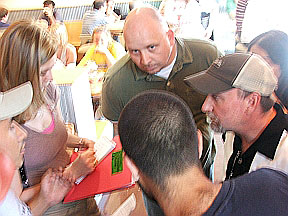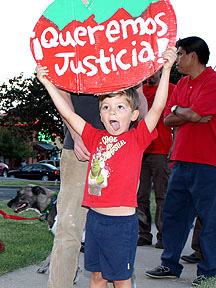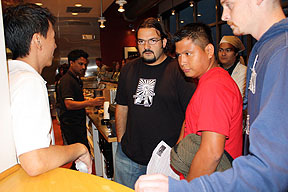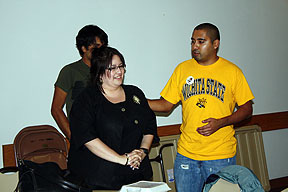September 30 – October 12
|
Days 7 & 8: Lawrence, KS &
After wrapping up three action-filled days in Denver, the Tour crew headed back east on a beeline straight for the next stop and the next Chipotle protest, this time in Lawrence, Kansas, hosted by our old friends from Lawrence Fair Food. Meanwhile, allies off the Tour route stepped up their own work in support of the Chipotle campaign. Leading human rights organizations within theAlliance for Fair Food (AFF) have been busy putting the finishing touches on a position paper regarding the issue of human rights and Chipotle’s claim to being a “sustainable food leader” in the fast-food industry. Here’s an excerpt from the soon to be released report, entitled, “Challenging Chipocrisy: “Food With Integrity” Must Respect Farmworkers’ Human Rights”: “…Food production is not sustainable if it is undertaken at the cost of degrading basic human rights by exploiting the labor of farmworkers. Even companies that have expressed a commitment to sustainable food, such as Chipotle, often buy produce from growers who have subcontracted labor under conditions clearly violating these basic human rights norms. Increasingly, however, as evidenced by Whole Foods recent agreement to join in partnership with CIW, the sustainable food community is speaking and acting out against benefiting from these human rights violations by receiving cheap fresh produce picked at the expense of human dignity. More importantly, the sustainable food community, and in particular large food purchasers like Whole Foods, as well as the consumers themselves, are recognizing that they are the ones that have the power to change this abusive system.” |
“… As Larry Cox, the Executive Director of Amnesty International, has stated: “No major social or economic system may be permitted to function at the expense of basic human rights; the food system is no exception. There are viable solutions in agriculture that ensure the human rights of farmworkers, while also better protecting sustainable and healthy food production.” “In order to live up to its commitment to serve sustainable food, Chipotle must join those, such as CIW, who are seeking to implement viable solution in agriculture to protect farmworkers’ human rights.” “If Chipotle wants to maintain its image as a leader in bringing sustainable food to the mainstream market… it needs to take responsibility for pursuing sustainability throughout its supply chain, including in regards to the human beings who pick the produce integral to its menu. “In the meantime, the great distance between Chipotle’s stated ideals as presented in its marketing campaigns and its behavior can only serve as fodder for tragic irony, or “Chipocrisy.” “For example, every Chipotle store features original artwork by Bruce Gueswel which is inspired by the artistic style of the ancient Mayans. At the same time, the farmworkers represented by the CIW include a large number of actual Mayan Indians. Yet, Chipotle seems more concerned with preserving the remnants of Mayan artistic influence than in protecting the rights of rights of actual Mayans, whose ancestors’ artwork adds an “authentic” touch to Chipotle’s stores.” (emphasis added) Check back next week to see the AFF position paper in its entirety… |
|
Like most colleges and universities, KU outsources its dining services to one of a handful of powerful corporations (such as Aramark, Compass and Sodexho) who dominate the industry. Over the past years, students have taken on these companies over a variety of issues – including the rights of campus workers to organize and earn fair wages and more accessibility to sustainable food options. As major purchasers of tomatoes (and often the franchisees of the on-campus versions of national fast-food chains), these companies also fall within the scope of the Campaign for Fair Food, and will certainly be hearing from our allies with theStudent/Farmworker Alliance in the weeks and months to come. |
In Lawrence, the action began with a march across KU campus (pictured in the first frame of this update, above left) to this Chipotle restaurant on bustling Massachusetts Ave., where protesters approached customers enjoying their meals with a bit of information about the truth behind the tomatoes they were eating. Here a customer puts down his burrito and picks up a flyer to learn more what companies like Chipotle would never tell him about the history of the food they sell in their restaurants… |
 … while protesters gave out over 100 free burritos produced with local, sweat-free ingredients. The burritos – and the message – were well-received by all, and folks eagerly lined up to sign the letter to the manager. |
 After a few hours of downtime to catch up with our Lawrence Fair Food friends, the Tour crew hit the road once again, destination: St. Louis. Upon their early arrival, they wasted no time getting down to business, making their way to this Chipotle restaurant. There, they were joined by several members of the National Farm Worker Ministry – longtime and indispensable supporters of the CIW and and Campaign for Fair Food. |
|
|
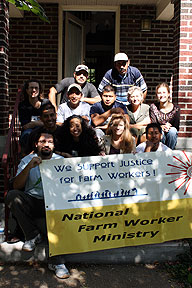 Wrapping up yet another successful action, the Tour crew bid farewell to the friends from NFWM as the clock (and the next destination) beckoned. Next stop: Louisville! |
|
Days 5 & 6: Denver, CO
|
|
 … where they would remain day… |
 … and night, for the next 30 hours, bearing witness to the message that, unlike the farm animals in Chipotle’s supply chain, farmworkers have a voice of their own, and the workers who pick Chipotle’s tomatoes will not allow themselves to be marginalized any longer. |
 During the course of the day, CIW members and allies made their presence known throughout Denver, raising consumer awareness by passing out flyers in front of this restaurant downtown… |
 … and giving presentation after presentation (12 in all!) in a number of universities not only in Denver, but nearby Boulder, as well. |
|
The delegation spoke with Mr. Spong for a few minutes before inviting him to take a look at some of the more than 85,000 signatures from consumers across the country to the CIW’s National Petition to End Sweatshops and Slavery in the Fields (including over 4,000 signatures from members of the farmworker community in Immokalee – shown stretched across the length of Chipotle’s headquarters in the following photo). |
Chipotle, as it has shown time and again over the past several years, can’t possibly know what’s best for workers in Florida’s fields. The company doesn’t have any idea about the conditions workers face there every day, and they never will as long as they rely on the farm owners for information (or try to investigate conditions themselves, as farm supervisors are well practiced at the art of intimidation). Until they finally decide to work in true partnership with the people who know the reality of those abuses best — the workers themselves — Chipotle’s efforts to end labor abuses where their tomatoes are picked will remain, at best, a public relations answer to a human rights crisis. |
|
|
“Woe to those who make injust laws, to those who issue oppressive decrees to deprive the poor of their rights and withhold justice from the oppressed.” to call upon Chipotle to “cease with its unjust policies, |
 And, as the temperature continued to fall, the Tour crew (bundled up in scarves, gloves and hats generously loaned by their Denver allies) settled in to continue the vigil on through the night. While the cold concrete didn’t exactly make for the most comfortable of sleeping conditions… |
 … the crew (and adorable allies!) were up bright and early the next morning, refreshed and ready for another day. |
 Much like the previous day, presentations throughout the city took encampment members away from the action, but a core group was always present to keep vigil … |
 Until finally, later that day, the encampment was brought to a moving close by Denver’s own Aztec dance group, Grupo Tlaloc. |
 And though the crew bid farewell to Denver – and to their wonderful allies (including their gracious host and indefatigable organizer for these past three days, Robert)… |
Next up: Lawrence, KS! |
|
Day 4: Denver, CO
|
The windmills reminded us as well that Chipotle had recently announced plans to construct a “green” restaurant in Illinois. The restaurant will feature its own on-site wind turbine to provide some of the facility’s electrical power. Chipotle is to be commended for its environmental leadership and commitment to “sustainable design.” It’s commitment to human rights, on the other hand, appears to be little more than empty spin (couldn’t resist that)… On the serious side, as there can be no food on America’s tables without farmworkers, there can be no true sustainability without full human rights, a simple truth that no amount of eye-catching sustainable design can ever change. |
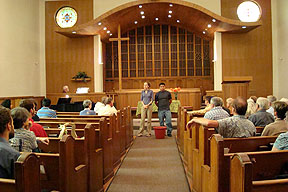 Upon their arrival in Denver, the crew quickly got to work, spreading the word about the Campaign for Fair Food to several faith congregations throughout the city – from an address to the entire congregation of the 6th Avenue United Church of Christ… |
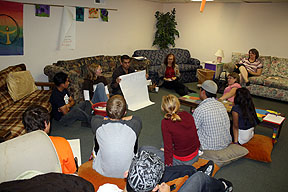 … to a more intimate presentation with this youth group at the First Universalist Church. |
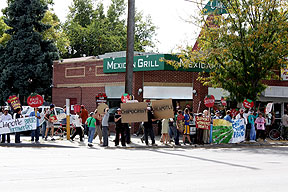 Then it was time to once again take our message to the streets! But this was no ordinary Chipotle action… |
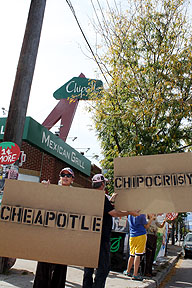 … today the people of Denver took their message of discontent to the very first Chipotle restaurant, opened here at the corner of Evans and Gilpin — a stone’s throw from the University of Denver campus — in 1993. |
|
In this photo we see the conclusion of the theater: a CIW member celebrating victory after a tug-of-war with Chipotle founder and CEO Steve Ells over a single penny. |
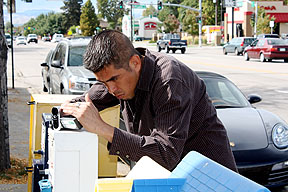 The ever-attentive CIW media crew was busy documenting the scene, to be later shared with the community back in Immokalee. |
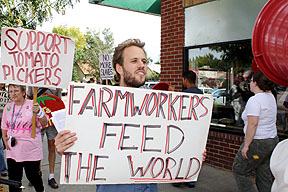 After the theater, protesters got down to business, leaving no doubt as to who was responsible for the food found on the tables inside. After nearly an hour of high-spirited picketing, it was time again for a delegation to meet the management. |
But from friction can come light, and indeed this discussion shed a good deal more light on the reasons for Chipotle’s refusal to enter into a real partnership with the CIW. When asked whether the company does all its business based on handshakes — as Chipotle insists is the best it can do when it comes to farmworkers — or whether it requires signed agreements with its farm suppliers, the Chipotle representative let us in on how Chipotle views the difference between farmworkers calling for human rights and farmers selling produce, saying a formal agreement isn’t necessary in our case because “We don’t buy tomatoes from the CIW.” Again: “We don’t buy tomatoes from the CIW.” Apparently, from Chipotle’s point of view, ensuring the full respect of human rights in its supply chain doesn’t rise to the same level as ensuring that the tomatoes it buys are the right size and consistency… Or maybe Chipotle thinks they can go it alone on farmworker rights, since they’ve done such a bang-up job to this point… Or maybe, for whatever reason, Chipotle’s just more comfortable working in respectful partnership with family farmers than with farmworkers… |
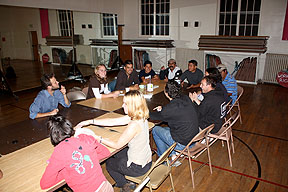 Whatever the case may be, the crew eventually wrapped up the protest and, later that evening, joined a group of close Denver and Boulder-based allies to share a meal, debrief on the day’s developments and nail down the final details for the beginning of tomorrow’s encampment at Chipotle headquarters. |
 Everyone got into the action – even 8-month old Mixtli, shown here revising some of the meeting notes. Check back for the update for tomorrow, which promises to be one of the most powerful days of the tour as workers from Immokalee begin a 30-hour vigil in front of Chipotle. |
|
Days 1 & 2: Austin, TX
|
|
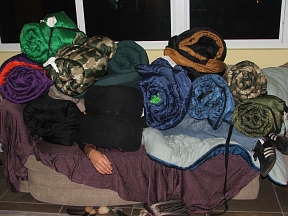 The road to Austin began, of course, 1,300 miles away in Immokalee. On Tuesday morning, before dawn, the Tour crew loaded the vans with materials and luggage – including this mountain of sleeping bags and the slumbering tour member underneath – for the long journey ahead… |
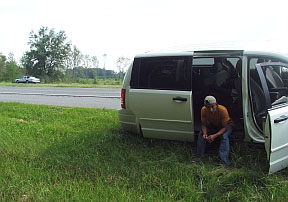 … a journey that got just a little bit longer before we had even left the state of Florida, as one of our two vans broke down outside of Tallahassee, on the side of I-10. Not the most propitious start to the two-week tour, but, hey, a mini-tour isn’t a mini-tour until you’ve had your first vehicle problem… |
 Requisite travel snafus aside, the crew persevered and arrived in Austin just in time to meet with leaders from the Proyecto Defensa Laboral (PDL), a local organization struggling for racial and economic justice for low-wage workers in Austin. |
|
|
|
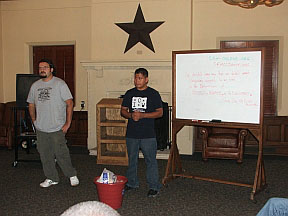 Then it was off to the University of Texas – a stalwart in the Boot the Bell campaign – where CIW greeted a new generation of UT students with a quick quiz. See if you can identify what is missing from this statement by Chipotle founder and CEO Steve Ells: “We decided long ago that we didn’t want Chipotle’s success to be tied to the exploitation of animals, farmers, or the environment.” |
|
… Mr. Ells, you forgot farmworkers. |
That has been the truth behind our food since the country was born, and it remains true today. For a company like Chipotle — a company that aggressively markets itself as a sustainable food leader, and a company that has profited from farmworker exploitation for years — to be blind to that reality for so long can only be described as hypocrisy (well, there may be one other word that could capture it… it’s on the tip of my tongue…)… |
|
|
|
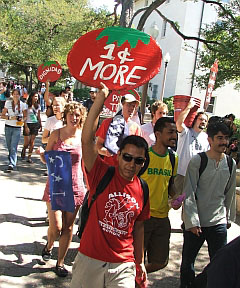 Our message was clear: The time has come for Chipotle to join other industry leaders in entering into an agreement with the CIW to pay 1 penny more per pound for the tomatoes that it purchases to increase farmworker wages, stagnant now for 30 years… |
|
|
Farmworker participation is essential to the CIW agreements with other fast-food leaders because, unlike the animals that Chipotle has sought to protect, farmworkers have their own voice and must be genuine partners in change if Chipotle is to be serious about its commitment to “revolutionize the way America grows and gathers its food”… |
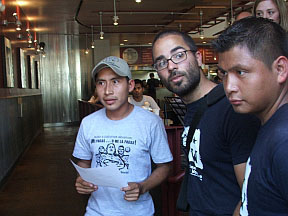 As the spirited action wrapped up, a delegation of CIW members and local allies wanted to be sure to deliver their message directly to the store’s manager. In an interesting turn of events, however, they ended up meeting not only with that store manager… |
|
Mr. Shaw presented us with Chipotle’s newest response to the campaign (see the home page for a detailed update on their latest move and the CIW’s response). The Tour crew thanked Mr. Shaw for the news, and let him know that the protests would continue until Chipotle had actually met the standards already established by other fast-food leaders. |
First they ignored us, then they fought us, and now they are pretending that we have won. After denying the need for change in Florida’s fields and refusing to even meet with us for nearly three years, Chipotle’s newest strategy is to claim that they have now unilaterally “met our demands,” all the while refusing to recognize farmworkers as human beings and true partners in the food industry. Recognition of farmworkers as essential partners in the changes we seek is in fact central to all of our demands, indeed central to the very notion of human rights. And so, the 2008 Chipocrisy Tour continues, next stop Wichita, Kansas. Check back tomorrow for an update from Wichita, and, in the meantime, don’t miss this segment on the Chipotle protest from Austin Public Radio (KUT). |
|
Day 3: Wichita, KS
|
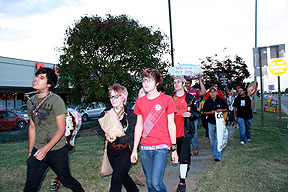 The activities began with a half-mile march down Wichita’s main commercial drag to a nearby Chipotle restaurant… |
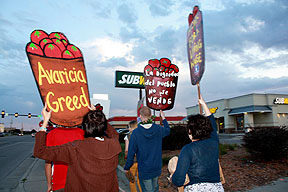 … along a route that provided an opportunity for a little dramatic foreshadowing of protests to come (Subway, don’t think we’ve forgotten about you…)! |
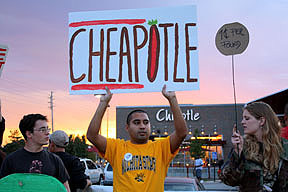 But today’s focus was the “sustainable food leader” of the fast-food industry, and upon arrival marchers wasted no time making their message known. |
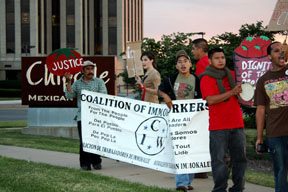 As always, the CIW led the action… |
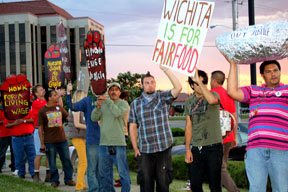 … and was joined by Wichitans from all walks of life: from students at nearby Wichita State University… |
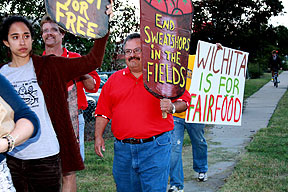 … to members of the Labor Council for Latin American Advancement (LCLAA), Alliance for Fair Food endorsers who just celebrated 35 years of advancing social, political and economic justice for Latinos throughout the Americas… |
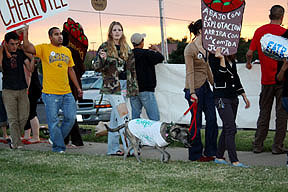 … right down to this friendly pup named Bella, who sported a t-shirt declaring her support for fair food. |
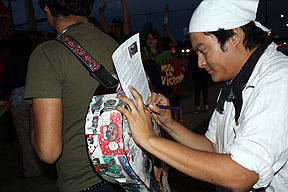 Then it was time to see what this particular Chipotle would have to say for itself. Demonstrators added their final signatures to a letter to the manager… |
After alerting the delegation that he had been told to expect us, the manager repeated Chipotle’s current stance on the campaign (see the home page for a detailed update on their latest move and the CIW’s response). But he also listened intently as CIW members explained the simple truth that farmworkers — as the very human beings suffering poverty wages and human rights abuses in the fields — must play an integral role in designing, implementing, and monitoring any realistic effort to improve farm labor conditions… and that a letter like Chipotle’s, written for the public, is not the same as an agreement like those between other fast-food leaders and the CIW, forged to give structure to a partnership. |
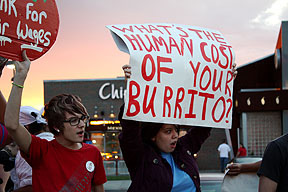 As the sun set on yet another day of the Chipocrisy tour, Chipotle had a lot of questions to answer. |
Check back soon for an update as the tour rolls into Chipotle’s backyard: Denver! |

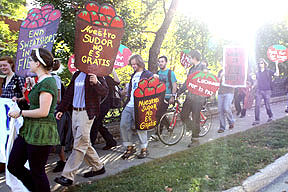

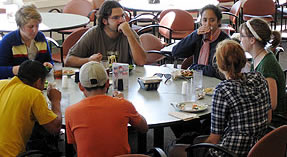
 And, of course, no Tour stop would be complete without an action.
And, of course, no Tour stop would be complete without an action.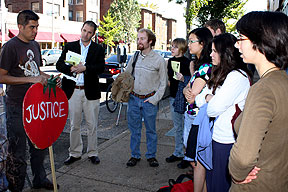






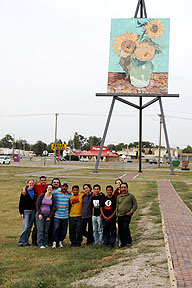

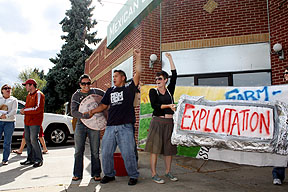
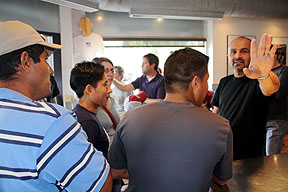
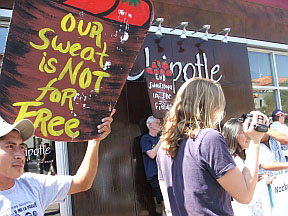
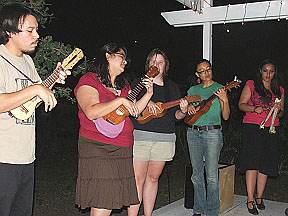
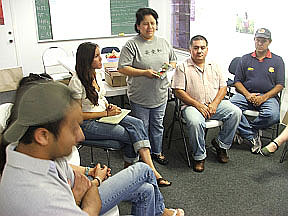
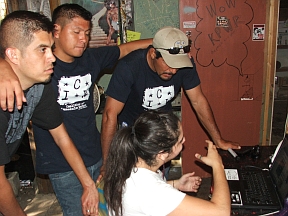
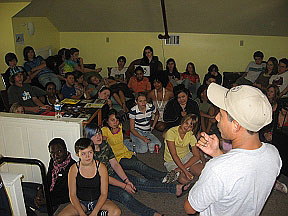
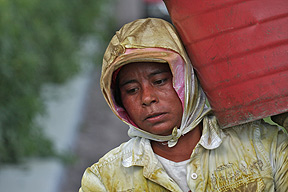

 … with a march to the nearby Chipotle restaurant, quite conveniently located right next to campus.
… with a march to the nearby Chipotle restaurant, quite conveniently located right next to campus.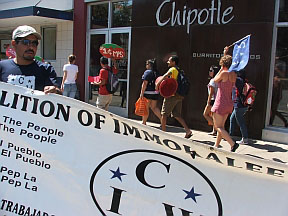 … to work together with the CIW to develop and implement an enforceable, human-rights based code of conduct in its supply chain to reverse decades of inhumane treatment of workers in the agricultural industry…
… to work together with the CIW to develop and implement an enforceable, human-rights based code of conduct in its supply chain to reverse decades of inhumane treatment of workers in the agricultural industry…